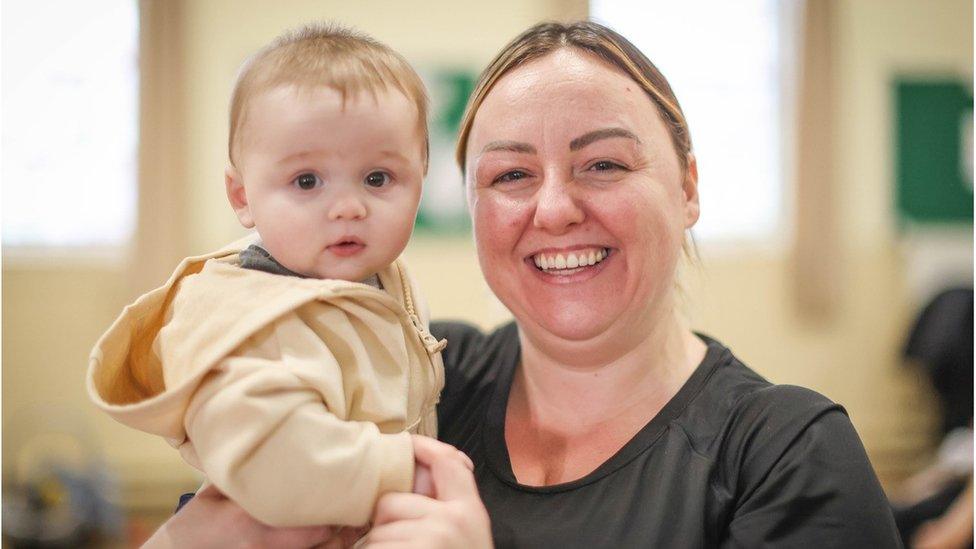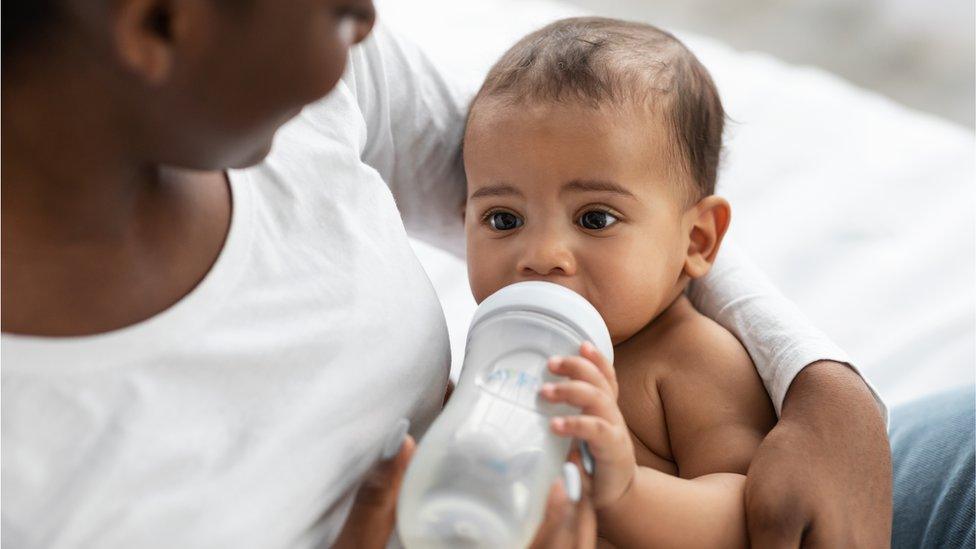I'm cutting my maternity leave because of rising costs
- Published

Stacy Young's son Lewis is now six months old
For many parents maternity leave offers important bonding time with a new baby but for some the financial loss is starting to outweigh the personal gain.
Stacy Young, from Kirkcaldy in Fife, gave birth to her youngest son Lewis six months ago.
She and her husband are already parents to a seven-year-old boy and realised they would need to save money ahead of trying for a second baby.
Stacy is eligible for 12 months of maternity leave but the last three months are unpaid so she always knew she would need to return to work after nine.
However, she says the growing cost of baby essentials means she has been forced to reassess and will go back to work almost three months early.
"I was hoping that the budgeting I'd done would allow me to stay off for the full nine months," she says.
"With my first, I did not get to do that, and I thought with this one, I wanted to spend a bit more time with him.
"But things have increased so much that the money's not there so I've got to go back to work."
'Massive cost'
For Stacy, the price of formula milk has been the hardest cost to cover.
She assumed she would breastfeed her son but wasn't able to. This means she is now bulk-buying tubs of formula in a bid to save money.
"It's a massive cost," she says. "They'll go through a tin of milk in a few days."
Stacy is currently on statutory maternity pay of £172 a week but says she needs to return to her job as a quantity surveyor at Fife Council to increase her earnings.
She says that although she will have to pay for childcare the little bit of extra money she ends up with each week will make a big difference.
"I know for a fact when I drop him off, I'll be crying in the car on the way to work," she says.

Kim Milligan initially wanted to take a year of maternity leave but now plans to return to work after nine months
During her maternity Stacy has been attending a fitness class for mums and babies in Markinch where she has able to meet other local parents.
Kim Milligan is a first time mum who also lives in Kirkcaldy with her three-month-old son Kai and her husband.
She initially wanted to take a year of maternity leave from her job as an NHS support worker but now plans to return after nine months because she is struggling to make ends meet.
"My son is on eight ounces of milk and we're feeding him Aptamil which is £15 per tub," she says.
"That's a lot of money. You're talking £15 a week, if not more than that.
"I had hoped to take a year off but I'm going back after nine months because it's all much more expensive than what I thought."
Some of the largest price hikes in baby essentials have been in baby formula and nappies.
The Competition and Markets Authority (CMA) recently said prices for baby formula milk had risen by a quarter in two years.
Last week, manufacturing giant Danone announced it was reducing prices on the majority of its Aptamil range by 7%, saying it recognised the challenges faced by parents due to inflation.

What are maternity rights?
Most employed mothers are entitled to 52 weeks of maternity leave
Statutory maternity pay for eligible women is usually paid at 90% of their weekly wage for the first six weeks, with the remaining 33 weeks at £172.48 a week or 90% of their weekly wage, whichever is lower.
The final three months are unpaid.
Women who earn less than £123 a week are not eligible for statutory maternity pay; instead most can claim maternity allowance.
Employees can change their return-to-work date if they give eight weeks' notice.

Are you cutting your maternity leave short because of rising costs? Share your experiences by emailing haveyoursay@bbc.co.uk, external.
Please include a contact number if you are willing to speak to a BBC journalist. You can also get in touch in the following ways:
WhatsApp: +44 7756 165803
Tweet: @BBC_HaveYourSay, external
Please read our terms & conditions and privacy policy
If you are reading this page and can't see the form you will need to visit the mobile version of the BBC website to submit your question or comment or you can email us at HaveYourSay@bbc.co.uk, external. Please include your name, age and location with any submission.
- Published15 January 2024

- Published10 January 2024
